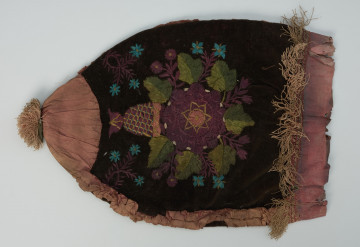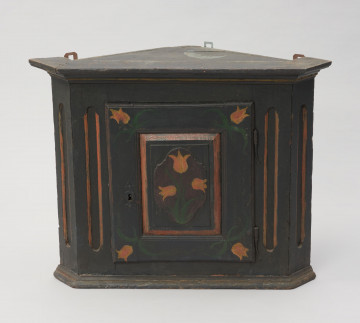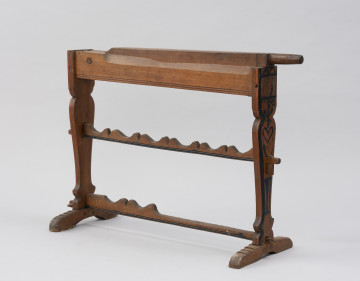
Handbag
2. połowa XIX wieku
National Museum in Szczecin
Part of the collection: Pyrzycka folk culture
A wedding box (Spanschachtel) was one of the gifts given to the bride and groom in the 19th century Pomeranian village. In traditional folk culture, the essential wedding gift was arable land, a meadow, a forest, and sometimes a place for building a house or a house, or shares in a mill, a sawmill, a farm, etc. A wedding box was anything that would provide a family with a stable and relatively secure income, providing a living for the newly forming family. The newlyweds received these gifts from their parents, sometimes from grandparents, in very exceptional cases from other people. What and how much a son or daughter would receive was decided during the so-called zmówiny [betrothal] (also known as swaty [matchmaking], dziewosłęby, śwadźba). Often challenging and impulsive, these talks were conducted by a matchmaker, a person representing the family of a bachelor trying to get a maiden. He had to be a good and calm negotiator, tactful but also clever. People with such qualities were respected in the village community. The guests invited to the wedding did not bring gifts for the bride and groom. Participation in the wedding rite was a social recognition that a new family had been formed and an act of mutual exchange of gifts within the village community (mutual participation in weddings). The oval wedding box, consisting of a deep box and a flat, shallow lid, was used to store the housewife's trinkets: beads, ribbons, garters, handkerchiefs, and devotional items; sometimes significant family documents, letters, and, at the end of the 19th century, the first photographs were put in it.
Iwona Karwowska
Author / creator
Dimensions
cały obiekt: height: 19,5 cm, width: 29,3 cm
Creation time / dating
Creation / finding place
Identification number
Location / status

2. połowa XIX wieku
National Museum in Szczecin

połowa XIX wieku
National Museum in Szczecin

1801 — 1900
National Museum in Szczecin
DISCOVER this TOPIC
Castle Museum in Łańcut
DISCOVER this PATH
Educational path